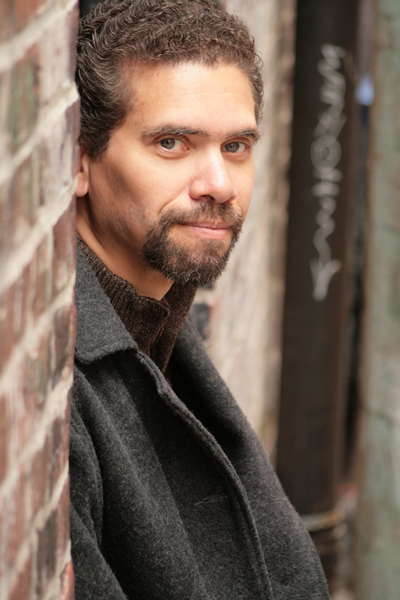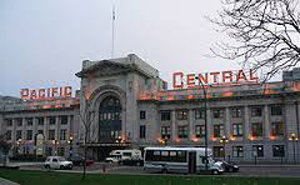#41 Wayde Compton
January 14th, 2016

LOCATION: CN Station, 1150 Station Street, near Main Street @ Terminal Avenue
As the foremost proponent of black literature in Vancouver, poet, historian and turntablist Wayde Compton edited Bluesprint: Black British Columbian Literature & Orature (2001) and he remains acutely aware that this bustling CN train station (that gave rise to the nickname Terminal City) is where most immigrants arrived in B.C. up until the 1950s. This was also the place where many black men went to work each day. Because so many black men in Vancouver worked as porters on the CN trains, there arose, in close proximity, a thriving black community called Hogan’s Alley. Compton has since anthologized the writing of more than 40 black writers of B.C. “Black culture,” he says, “is a whole lot more than just a response to racism.”
ENTRY
After a one-year stint at the Vancouver Public Library’s seventh writer-in-residence in 2011, Wayde Compton took over from Betsy Warland as the director of Simon Fraser University’s Writers Studio in 2012 and later released his first collection of short stories, The Other Harbour (Arsenal Pulp 2014). It received the $300 City of Vancouver Book Award from a field of finalists that included the illustrated kids’ book Mr. Got to Go, Where Are You? by Lois Simmie and Cynthia Nugent, a local history entitled Live at the Commodore by Aaron Chapman, and Bren Simmers’s poetry collection Hastings-Sunrise. Previous winners include Amber Dawn, Michael Christie, Chuck Davis, Jean Barman, Madeleine Thien, Wayson Choy, and inaugural winner Paul Yee.
In 2002, Wayde Compton instigated the Hogan’s Alley Memorial Project, with a goal to preserving the public memory of Vancouver’s original black neighbourhood. Hogan’s Alley was the informal name given to Park Lane, an alley running through the southwestern corner of Strathcona in Vancouver’s East End.
Wayde Compton also helped found the Contact Zone Crew, with Vancouver musician, deejay and teacher, Jason de Couto, a ten-year collaborative sound poetry project that travelled Canada performing live audio mixes of original poetry, instrumental vinyl and spoken word recordings.
Poet, historian and turntablist Wayde Compton is determined to make a stand that is rooted in history. As editor of Bluesprint: Black British Columbian Literature & Orature (Arsenal Pulp, 2002), he is aware the Greyhound bus station was formerly the bustling CN train station where most immigrants arrived in B.C. up until the 1950s. This terminus that gave rise to the term Terminal City was also the place where most black men went to work each day. Because so many black men in Vancouver worked as porters on the CN trains, there arose, in close proximity, a thriving black community called ‘Hogan’s Alley.’ This enclave in the Strathcona neighborhood is little known today. All the more reason to meet him there to take some photos to promote Bluesprint–his unprecedented 300-page anthology of black literary voices.
During our interview, Compton sometimes seems inarticulate, barely raising his voice loud enough to be recorded, and yet Compton is a vibrant intellectual who is familiar with the works of Frantz Fanon; an English teacher who is confident in his knowledge and opinions; and a published poet who is a great fan of Jimi Hendrix as a Pacific Northwest literary influence. “I started writing because of Jimi Hendrix,” he says. “It was because of Electric Ladyland, Voodoo Child; Moon Gently Turn The Tide, all of it. His lyrics were psychedelic and bluesy, too. In terms of blackness, there’s something really interesting about Hendrix. Something Pacific Northwest about him. All those southern blues influences are refracted through his years of isolated bizarreness. I think that’s what you get in this part of North America, the last place to be colonized.” Growing up, Wayde Compton heard all sorts of apocryphal stories about Jimi Hendrix hanging around Vancouver, jamming with the likes of Tommy Chong (of Cheech ‘n’ Chong), going to elementary school in Vancouver, living with his grandmother Nora Hendrix. He’s quick to add that Jimi Hendrix’s father attended his own junior high school on Vancouver’s eastside, Templeton. Then he slips back into cautious sentences.
Compton’s humility is born of respect, not just shyness. In the process of gathering the contents for Bluesprint, Compton has grown deeply respectful of his predecessors. He also recognizes the work to uncover 43 other black writers of British Columbia–ranging from Sir James Douglas to the hip-hop group The Rascalz–was partially done by others. He acknowledges Selwyn Jacobs’ documentary of black porters, The Road Taken (1996), Cornelia Wyngaarden and Andrea Fatona’s video Hogans Alley (1995) and Daphne Marlatt and Carole Itter’s Opening Doors: Vancouvers East End (1979). His introduction to Bluesprint offers careful, concise tidbits about all 44 writers who are presented in chronological birth order, plus diplomatic references to white author Crawford Kilian who produced Go Do Some Great Thing: The Black Pioneers of British Columbia (1978). A friend who edits the Capilano Review encouraged him to start the project. Before that, Compton had learned about Hogan’s Alley from his parents. “My Dad came up here from the States in the late ’50s,” he says. “My Mom was hanging out in the clubs on Main Street. So they’d always talked about it, but I didn’t know it was Hogan’s Alley.”
As for personal influences, Compton has an affinity with Peter Hudson, editor and publisher of the ‘astonishingly good but short-lived’ diaspora: a magazine of black consciousness and culture. More strident in his social criticism than Compton, Hudson refers to the beloved and illiterate English Bay lifeguard and swimming instructor Joe Fortes, as Vancouver’s ‘first boot black.’ As for Compton’s discoveries as an editor, he is particularly intrigued by Truman Green. Still a resident of Surrey, Green wrote a semi-autobiographical novel A Credit to Your Race (1973), in which a 15-year-old black porter’s son falls in love with, and impregnates, the white girl next door. “If isolation is a key theme of black B.C. writing,” says Compton, his protagonist “Billy Robinson is the most fully-drawn expression.” Set in Surrey, circa 1960, A Credit to Your Race is a disturbing and convincing portrayal of how the full weight of Canadian racism could come to bear on a youthful, interracial couple. “He’s pretty diplomatic in the way he describes it,” says Compton. “His was the first black novel to come out of Western Canada and it got passed over.” After rejection from one trendy literary press in eastern Canada, Truman Green self-published in a limited run of 300 copies.
“In black culture,” says Compton, “racism becomes a lightning rod for how you’re supposed to talk about yourself. But racism is only one aspect of your life.” Consequently Bluesprint is broad in its scope. The contributors tell a cumulative tale that few British Columbians have heard. At the invitation of Governor James Douglas, himself partly black, some 600 blacks were invited to move en masse from San Francisco in 1858. Eager to leave behind racial persecution, these blacks, Douglas knew, would become loyal citizens in his fight to prevent the colony from possible annexation to the United States. When the black population of B.C. rose to an estimated 1,000 people, they briefly comprised almost one-tenth of the non-Native population. Their presence on the West Coast, particularly within the militia and especially on Saltspring Island, had a profound impact in the genesis of British Columbia. Eventually Emery Barnes and Rosemary Brown would simultaneously become, in 1972, the first two black MLAs elected in Canada.
Bluesprint occasionally betrays its origins as an academic thesis. For instance, Compton writes, ‘Avoiding the autoexoticist ‘tragic mulatto’ narratives, these writers seek to dismantle binary and standardizing racialized epistemologies.” Say, what? But this anthology succeeds as an heroic effort to put wagons into a circle. Compton includes, to borrow a phrase from Hope Anderson, ‘the prolonged cry of despair’ while also moving far beyond it, like Hendrix did, bold as love.
Compton’s preceding book, 49th Parallel Psalm, was shortlisted for the Dorothy Livesay Poetry Prize in 2000. Dedicated to the memory of Emery Barnes and Stokely Carmichael, his poetic riffs recall and examine the migration of blacks to British Columbia. The chronicle of ‘endless arrival’ and racial discrimination was the first release under Michael Turner’s new Advance Editions imprint. In it Compton quotes Derek Walcott: “I met History once, but he ain’t recognize me.” Compton’s second collection of hip-hop-inspired poetry, Performance Bond, included a CD of a turntable performance. It deals with the black diaspora and urban renewal, complete with musical beats and samples.
His first non-fiction book, After Canaan: Essays on Race, Writing and Religion (Arsenal, 2010), ‘riffs on the concept of Canada as a promised land’, which is also referred to as ‘Canaan’. Compton explores the concept of ‘passing’ (racial misrecognition), black writers in the ‘unblack Pacific Northwest’, hip hop turntablism, black and Asian comedy and the impact of the ‘Obama phenomenon’.
Lorna Goodison, Wayde Comptom and Tanya Evanson are among 90 contributors to the first national anthology to focus solely on poetry by African Canadians, Great Black North: Contemporary African Canadian Poetry ($21.95), edited by Valerie Mason-John and Kevan Anthony Cameron, and launched during Black History Month in February of 2012. 978-1-897181-83-6
Review of the author’s work by BC Studies:
After Canaan: Essays on Race, Writing, and Region
Bluesprint
BOOKS:
49th Parallel Psalm (Advance Editions, Arsenal Pulp, 1999). 1-55152-065-6
Bluesprint: Black British Columbian Literature and Orature (Arsenal Pulp, 2002). $24.95.
Performance Bond (Arsenal Pulp, 2004). $22.95.
After Canaan: Essays on Race, Writing and Region (Arsenal Pulp, 2010) 978-155152-374-3 $19.95.
The Outer Harbour (Arsenal Pulp 2014). $16.95 9781551525723
The Revolving City: 51 Poems and the Stories Behind Them (Anvil Press 2015), co-edited with Reneé Saklikar. $18 978-1-77214-032-3
Library’s Seventh Writer in Residence: Press Release (Vancouver Public Library, 2011)
Acclaimed writer, poet and historian Wayde Compton, who has turned spinning a turntable into sound poetry art, is the Vancouver Public Library’s seventh Writer in Residence.
During his four-month tenure, Compton, an English instructor and the author of three books, will mentor emerging young writers and explore the possibilities of combining re-mix culture and traditional literary expression at community readings and events. Using turntables, Compton’s performance project involves sound recording, audio collage, live mixing and other aspects of the recorded word as a means of creating and editing poetry.
“Vancouver Public Library is thrilled to have Wayde Compton as our seventh Writer in Residence,” said Chief Librarian Sandra Singh. “Wayde’s unique approach to combining spoken word, sound recording and live mixing takes this popular and important residency in a new direction that will surely excite young writers.”
The residency allows the writer to spend 75 percent of the time writing and Compton will work on a short story collection. The remaining time will be spent on community projects and events and mentoring emerging writers one-on-one.
“The connection of the Writer in Residence to writers in the community is really important,” said Compton. “I think the act of writing is a civil act, and composing and reading creative works can be a vital part of making a good society.”
“Vancouver Public Library is central to my body of writing, in terms of the material the library acquires, houses, and protects. Its physical space is also essential for a writer like me who often creates through research.”
Compton’s first book, 49th Parallel Psalm (Arsenal Pulp Press), is dedicated to the memory of Emery Barnes and Stokely Carmichael and was shortlisted for the Dorothy Livesay Poetry Prize. This was followed by Performance Bond (Arsenal Pulp Press) and After Canaan: Essays on Race, Writing and Religion (Arsenal Pulp Press), which also received rave reviews. Compton edited the groundbreaking Bluesprint: Black British Columbian Literature & Orature (Arsenal Pulp Press), which The Globe & Mail called a “treasure trove” and “valuable historical reference work that attempts to trace a cultural lineage for a population that has always been in flux.”
Compton founded Commodore Books and the Hogan’s Alley Memorial Project. He lives in Vancouver and teaches English composition and literature at Emily Carr University of Art & Design and at Coquitlam College.
The Outer Harbour by Wayde Compton (Arsenal Pulp Press $16.95)
Wayde compton, who grew up idolizing Jimi Hendrix, is a self-described ‘Halfrican” (half African) writer/performer who knows how to shrug multiple identities on and off in his readings and performances.
Currently the director of the SFU Writers Studio, Vancouver-born Compton has long been committed to black history in B.C.
In 2002, he instigated the Hogan’s Alley Memorial Project, with a goal to preserving the public memory of Vancouver’s original black neighbourhood, an alley running through the southwestern corner of Strathcona in the city’s East End.
His latest offering of ten stories, The Outer Harbour, is peopled by shape shifters and chimeras in settings that exert special pressures.
Take, for example, his dystopian vision of Pauline Johnson Island. It’s an imaginary construct which he situates in the outer harbour of Vancouver, giving rise to his book’s title,
The entertainer/poetess Pauline Johnson immortalized the legend of a lost island in a short story about a century ago. Herself a shape-shifter, Johnson billed herself as a Mohawk Princess although she was only one-quarter Mohawk. She learned about the legend of an island “lost” in the North Arm, only rarely glimpsed, from Chief Joe Capilano.
In Compton’s stories this island could just as well be Ireland’s Surtsey Island or Graham Island in the Mediterranean, a volcanic island that appears and disappears. This mythical symbol of the struggle for survival in the face of colonialism and bureaucracy looms in the foreground of several stories.
“Pauline Johnson Island,” says Compton, when contacted by BC BookWorld, “is actually the primary ‘figure’ of the book. When I was writing these stories, I wanted to consider space itself as character-like, influencing relationships and themes in many of the ways that conventional characters do.”
So imagine a ten-storey luxury apartment atop Pauline Johnson Island in Burrard Inlet. Then picture it slightly altered to become a detention centre for migrants who wink themselves in and out, disappearing and materializing, individually or as a group.
Imagine Pauline Johnson’s ‘lost island’ as a scene of a pro-sovereignty protest that turns ugly, a young man shot and killed by the RCMP’s Counter Terrorism Unit during a subversive occupation.
In Compton’s world, boundaries are irrelevant and genres merge.
Characters, places and themes weave in and out of the ten stories: themes of race, immigration, consumerism, loss of freedoms, and bureaucratic bungling.
The stories take place between 2001 and 2025, so are some of them sci-fi? Compton concedes there are some elements of fantasy and speculative fiction, especially in matters of identity and political power. “I try to take this on. I guess I would say that I use a few tools common to fantasy and speculative writing to point at current conditions.”
In The Front we’re reminded that things change, forms evolve. It’s pointless to wish for permanence.
In The Outer Harbour, while Vancouver is burning, a dead six-year old migrant and a young man killed years earlier by a Counter Terrorism Unit unite to save a migrant ghost and help return him to the safety of Pauline Johnson Island.
In The Outer Harbour, glyphs, sketches, an excerpt from a paper and maps are part of the mix. The maps of Vancouver, as seen by the migrant ghost, were drawn by Compton’s five-year-old daughter.
In The Boom, everything is also laid out in posters, floor plans, ads, glyphs and sketches.
Although several of these stories have been printed in publications like The Fiddlehead and Event, each story feels essential to this collection. “I wrote the first story in the collection before I understood a book was coming,” says Compton, “and the rest emerged after it, although most of them aren’t necessarily derived from it.”
The Outer Harbour could be described as a literary equivalent of that old television show The Outer Limits, where life veers into creepy paranoia.
If shifting realities and a free-falling style disorient you, The Outer Harbour may not be your read. But it’s a challenging collection that marks a bold step forward for Compton.
Wayde Compton has also helped to create the Contact Zone Crew, with Vancouver musician, deejay and teacher, Jason de Couto, a ten-year collaborative sound poetry project that travelled Canada performing live audio mixes of original poetry, instrumental vinyl and spoken word recordings.
As well as producing six books, Wayde Compton founded Commodore Books, a publishing imprint named after the ship that brought the first significant batch of black immigrants to Victoria. At the invitation of Governor James Douglas, himself partly black, some 600 blacks were invited to move en masse from San Francisco in 1858. Eager to leave behind racial persecution, these blacks, Douglas knew, would become loyal citizens in his fight to prevent the colony from possible annexation to the United States. When the black population of B.C. rose to an estimated 1,000 people, they briefly comprised almost one-tenth of the non-Native population.
9781551525723
Cherie Theissen reviews fiction from Pender Island.
[INFORMATION POSTED JANUARY 14, 2016]




Leave a Reply